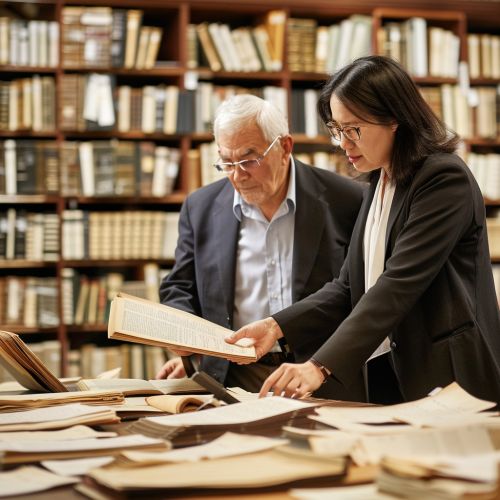Historical research
Introduction
Historical research is a methodical process of examining past events to understand the causes, effects, and contexts of those events. This discipline involves the systematic collection, evaluation, and interpretation of historical data. Historical research is essential for constructing accurate narratives of past events and for understanding the evolution of societies, cultures, and institutions over time.
Methodology
Primary Sources
Primary sources are original documents or physical objects created during the time under study. These include letters, diaries, official records, photographs, and artifacts. Primary sources provide firsthand accounts and direct evidence of historical events. Researchers must critically evaluate these sources for authenticity, bias, and relevance.
Secondary Sources
Secondary sources are interpretations and analyses based on primary sources. These include books, articles, documentaries, and biographies. Secondary sources provide context, synthesis, and scholarly perspectives on historical events. Researchers use secondary sources to build on existing knowledge and to frame their analyses within broader historiographical debates.
Tertiary Sources
Tertiary sources compile and summarize information from primary and secondary sources. Examples include encyclopedias, textbooks, and databases. While tertiary sources are useful for gaining an overview of a topic, they are generally not cited in scholarly research due to their derivative nature.


Research Process
Topic Selection
Choosing a research topic is the first step in historical research. Topics can range from specific events, such as the French Revolution, to broader themes like the development of industrialization. Researchers often select topics based on gaps in existing literature, personal interest, or the availability of sources.
Literature Review
A literature review involves surveying existing scholarship related to the research topic. This step helps researchers understand the current state of knowledge, identify key debates, and locate primary and secondary sources. A thorough literature review is crucial for framing the research question and methodology.
Formulating Research Questions
Research questions guide the investigation and determine the scope of the study. Effective research questions are clear, focused, and researchable. They should address specific aspects of the topic and be open to empirical investigation. Examples include: "What were the economic impacts of the Black Death on medieval Europe?" or "How did the Civil Rights Movement influence U.S. legislation in the 1960s?"
Data Collection
Data collection involves gathering relevant primary and secondary sources. Researchers may visit archives, libraries, museums, and online databases to obtain materials. Proper documentation of sources is essential for ensuring the accuracy and credibility of the research.
Data Analysis
Data analysis involves interpreting and synthesizing the collected information. Researchers critically evaluate sources for reliability, bias, and significance. They look for patterns, connections, and contradictions to construct a coherent narrative. Analytical techniques may include content analysis, comparative analysis, and contextual analysis.
Writing and Presentation
The final step is writing and presenting the research findings. Researchers organize their findings into a structured format, typically including an introduction, literature review, methodology, analysis, and conclusion. Proper citation of sources is essential to maintain academic integrity. The presentation may take the form of a scholarly article, book, or conference paper.
Historiography
Historiography is the study of how history is written and interpreted. It examines the methodologies, perspectives, and biases of historians over time. Historiography is crucial for understanding the evolution of historical scholarship and for situating new research within existing debates.
Schools of Thought
Different schools of thought have shaped historiography. These include:
- **Positivism**: Emphasizes empirical evidence and scientific methods.
- **Marxism**: Focuses on class struggle and economic factors.
- **Annales School**: Stresses long-term social history and interdisciplinary approaches.
- **Postmodernism**: Questions the objectivity of historical narratives and highlights the role of language and power.
Key Historians
Prominent historians have made significant contributions to the field. Examples include:
- **Leopold von Ranke**: Advocated for empirical research and primary sources.
- **Fernand Braudel**: Pioneered the Annales School and long-term historical analysis.
- **E.P. Thompson**: Influential in social history and the study of the working class.
- **Michel Foucault**: Examined the relationship between power and knowledge in historical contexts.
Challenges in Historical Research
Source Limitations
One of the primary challenges in historical research is the limitation of sources. Many historical events are poorly documented, and surviving records may be incomplete or biased. Researchers must navigate these limitations by corroborating evidence from multiple sources and acknowledging the gaps in the historical record.
Interpretation and Bias
Historians must be aware of their own biases and the biases inherent in their sources. Interpretation of historical data is subjective, and different historians may draw different conclusions from the same evidence. Critical self-reflection and transparency in methodology are essential for mitigating bias.
Ethical Considerations
Ethical considerations in historical research include respecting the privacy and dignity of individuals, especially when dealing with sensitive topics. Researchers must also be mindful of the potential impact of their work on contemporary communities and avoid perpetuating harmful stereotypes or narratives.
Technological Advances
Digital Archives
The digitization of archives has revolutionized historical research. Digital archives provide widespread access to primary sources, enabling researchers to conduct comprehensive studies without geographical constraints. Examples include the Digital Public Library of America and the Europeana digital library.
Data Analysis Tools
Advancements in data analysis tools, such as text mining and geographic information systems (GIS), have enhanced the ability to analyze large datasets and visualize historical trends. These tools allow for more sophisticated and nuanced analyses of historical phenomena.
Online Collaboration
Online platforms facilitate collaboration among historians, allowing for the sharing of resources, ideas, and peer reviews. Websites like Academia.edu and ResearchGate enable researchers to connect and engage with the global scholarly community.
Conclusion
Historical research is a dynamic and multifaceted discipline that requires meticulous attention to detail, critical thinking, and ethical considerations. By examining primary and secondary sources, historians construct narratives that illuminate the complexities of the past. Technological advancements continue to expand the possibilities for historical research, making it an ever-evolving field.
